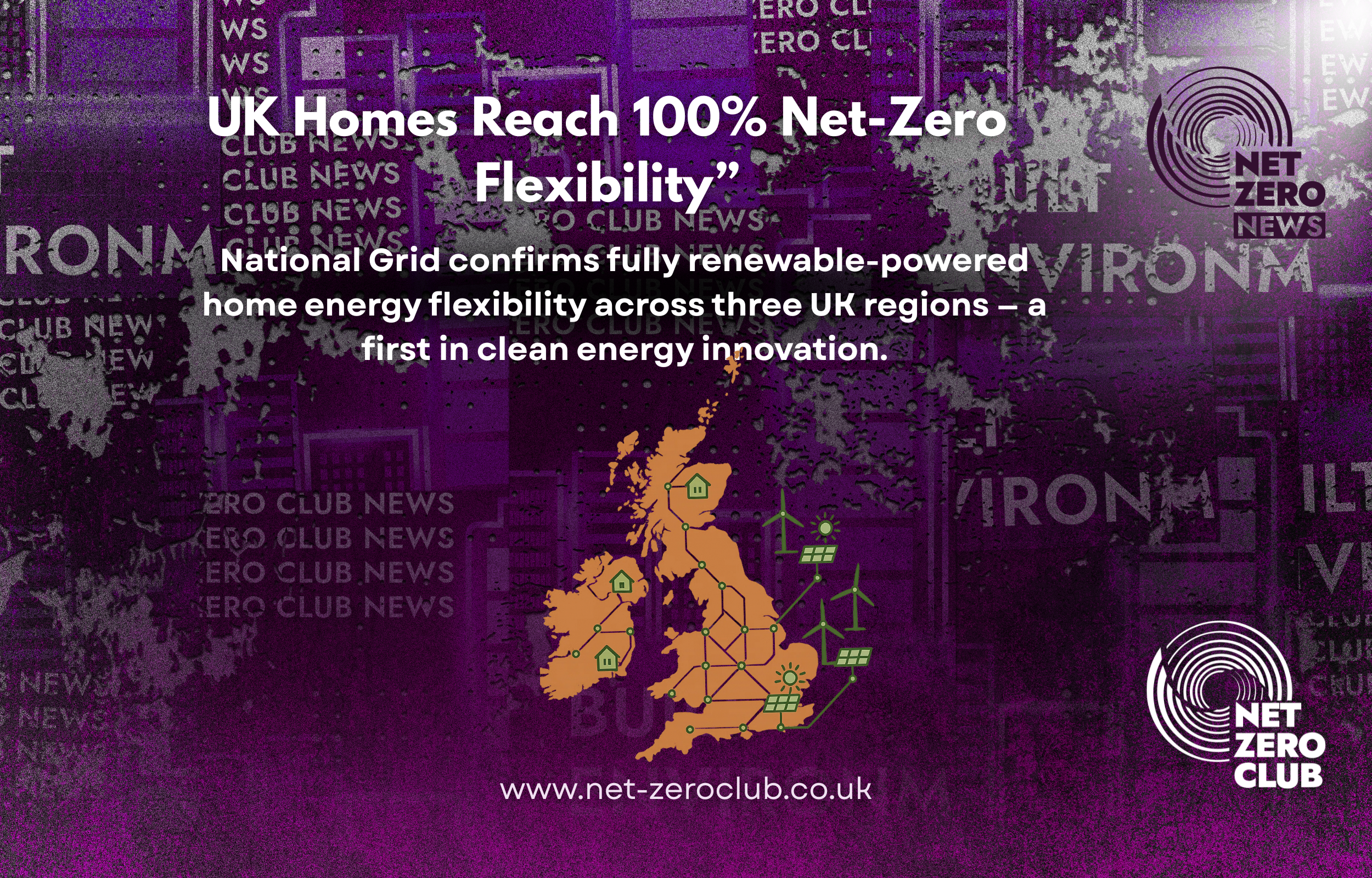Retrofit Homes to Hit 100% Net-Zero by 2025 with Grid Flexibility

Welcome to Net Zero News, where we bring you the latest developments driving the UK’s transition to a net-zero future. Today we look at groundbreaking figures from National Grid’s distribution system operator (DSO), which show that home energy flexibility in the Midlands, South West and South Wales has reached 100 percent zero-carbon status in 2025.
According to data published this month, household demand-side response services delivered through smart appliances and batteries across these regions now source their flexibility entirely from renewable generation. The milestone marks the first time domestic flexibility has been fully decarbonised under the National Grid DSO framework, underlining a new era in clean energy management.
Net Zero News can reveal that the DSO’s programme leverages advanced grid management software to aggregate small-scale energy assets – from electric water heaters to rooftop PV with storage systems – into a unified flexibility market. This market enables fluctuations in supply and demand to be balanced in real time, replacing the need for fossil-fired peaking plants at critical moments.
In a significant step towards the UK’s net-zero goals, the DSO initiative supports the government’s target of decarbonising the electricity system by 2035 and achieving net-zero emissions economy-wide by 2050. By integrating up to 500 megawatts of residential flexibility in key regions, National Grid DSO is enabling more efficient use of wind and solar generation while maintaining network stability.
This achievement matters because it directly addresses the seasonal and daily variability inherent to renewable energy. Fully zero-carbon flexibility reduces carbon dioxide emissions associated with balancing services by an estimated 120,000 tonnes per year, equivalent to taking 60,000 cars off the road. It also protects consumers from spikes in wholesale electricity prices by smoothing supply and demand peaks.
Beyond environmental gains, the programme has catalysed local job creation. National Grid estimates that over 1,800 roles have emerged across technology, installation and customer support since the DSO’s flexibility tender launched in 2023. Many of these positions are based in towns across the Midlands, supporting regional economic regeneration and advancing green skills training.
Funding for this groundbreaking work comes from a mix of private investment and government support. The Department for Energy Security and Net Zero (DESNZ) has committed £45 million through its Smart Systems and Flexibility Plan, while Ofgem has approved regulatory incentives valuing flexibility at up to £15 per kilowatt-hour of delivered service. In total, the initiative has unlocked over £120 million of investment across hardware, software and consumer engagement schemes.
Delivery partners include distribution network operators Western Power Distribution and SSE Networks, alongside aggregators such as Octopus Energy and EDF Energy Networks. Local authorities in the West Midlands, Devon and Swansea Bay have supported consumer outreach and planning consents, ensuring rapid rollout of smart meters and home energy management systems.
This announcement sits within a broader policy context that includes the 2021 Energy White Paper and the recently updated National Infrastructure and Net-Zero Strategy. Net Zero News understands this forms part of the government’s wider ambition to deploy 30 gigawatts of flexibility by 2030, in line with its commitment under the UK’s sixth Carbon Budget to deliver a low-carbon, resilient power system.
At regional level, Midlands Connect and the South West Energy Hub have highlighted the DSO flexibility success as a blueprint for local climate action plans. Their joint work on sector-coupling and district heat networks will now explore how residential flexibility can support decarbonised heating schemes and electric vehicle charging hubs in rural areas.
Industry players say the fully zero-carbon flexibility achievement showcases the potential for scalable demand-side solutions. Manufacturers of home batteries and smart appliances are preparing to ramp up production, while network engineers are refining algorithms to optimise response times and avoid curtailment of wind farms during high-output periods.
For communities, the benefits extend beyond cleaner energy. Households participating in flexibility trials have seen an average annual reduction of £120 on electricity bills. Consumer surveys indicate that over 70 percent of participants feel more engaged with their energy use, underscoring growing public acceptance of interactive, digital-first solutions to climate challenges.
Looking ahead, National Grid DSO plans to extend the fully zero-carbon flexibility model to the North East and East of England by mid-2026. The next phase aims to integrate electric vehicle smart-charging and heat pump thermal storage into the platform, further strengthening the link between decarbonised power generation and low-carbon transport and heating systems.
Net Zero News is powered by the Net Zero Club.
Join the UK’s fastest-growing net-zero community.
Upcoming Events:
– Net Zero Scotland Projects Conference
– Net Zero Nations Projects Conference
Got a net-zero project to share? Email: lee@net-zero.scot

 Got net-zero news, project updates, or product launches to share?
Got net-zero news, project updates, or product launches to share? 